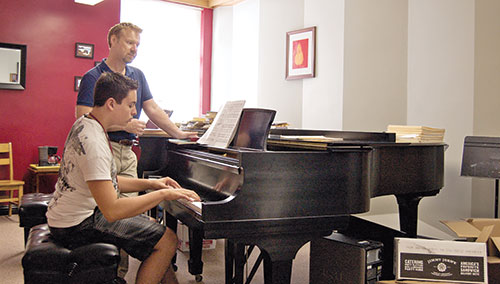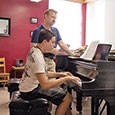Picking a college is so important for music majors because they will have one professor – a studio teacher – with whom they will spend the entirety of their college career. This relationship between student and studio professor can make or break the entire college experience. Ideally, a studio professor will become a mentor and teacher who can enhance your education every week.

photo courtesy of Florida State University
Starting
If you know you want to major in music, start looking at colleges as a sophomore in high school, while also thinking about what type of music degree to pursue. Different degrees require different kinds of preparation for auditions. Not all music schools offer a degree in education or performance. If you are looking for a school for music education it is potentially a different group a schools than if you were looking into music therapy, recording, music business, or performance.
Making a List
Use published lists to get highlights of schools. Ask present and former music teachers where they went and what their experiences were. The experience does depend on the individual, but finding out where teachers you respect went is a good place to start for a list. If other students from your district (or friends from nearby districts) pursued music, inquire about their experiences as well. Check the biography listings of symphony orchestras to see where these musicians went to school. For example, a bassist interested in performance would want to see where bassists in professional orchestras went to school.
What to Look For
Compile a list of these details of each school to compare and contrast. Check whether studio professors are adjuncts or full time, as well as how many there are for each instrument. Try to gauge whether the studio professor is likely to remain at the school for the whole time you are there.
Future music education majors should consider whether a school offers individual classes for secondary instruments or one class for brass and another for woodwinds. Note how much piano proficiency the school requires; more is better.
Future performance majors should give weight to the number and makeup of ensembles, especially whether they require auditions and whether there are separate groups for majors and non-majors. As a music major, you want as much playing experience as you can get in school. If ensembles are only open to music majors then you know you will get a better chance in one of the groups.
If there are non music major ensembles, you may be able to sit in on these as well. Music education majors should also consider joining such groups, possibly even on a secondary instrument.
Recording majors should look at how quickly they get on-the-job training. Some schools might permit recording recitals and concerts during the first year, while others might require students to wait until their senior year.
Visiting Schools
There is no substitute for going to the campus. College is a huge investment, and the music school that seems best from a distance might not be the right choice for you. The right school is the one that makes you feel comfortable and inspired to learn.
Tour the school, the dorms, and especially the music building. Many schools will allow you to meet with a music student if you contact the school of music directly. If you see music students walking around while you’re on tour, talk to them. People are usually happy to answer questions from interested students. Investigate the practice rooms and studios, as well as the performance hall.
When touring the music building, ask questions to fill in any gaps in your research. Here are good questions to consider:
• How often do the ensembles perform?
• How long is each lesson for music majors?
• Are non-music majors allowed in the performing ensembles?
• Can you double major?
• What is the practice room process?
• Am I automatically placed in an ensemble, or do I have to audition every semester?
• How many students are in the studio for my instrument?
If you are able to talk to a student at the school, also ask whether the environment is competitive and stressful.
Take a lesson with the studio professor. Prior to your visit, email this person, explaining that you are visiting the school and would like to take a trial lesson. This is an important part of the visit because you will see how you interact with the teacher that you might study with for four years. After you return home, email (or mail) the professor a thank you note. Even if you disliked the lesson, it is a good experience for figuring out what you are looking for in a teacher.
Advice from Current Students
I recently surveyed college students pursuing a degree in music from an array of different schools. Music majors were asked about their decisions and what advice they would give to future music majors.
When you decided you wanted to pursue music what did you do as a high school student to prepare?
“I talked to my high school music teachers and got a list of schools that were known for music education. Then I researched the professors at each college.”
“I talked to my private lesson teacher about what schools I wanted to go to. We looked at the requirements for auditions and prepared specifically for each audition. I also started taking bassoon lessons so I could play another instrument in a different clef. I took music theory and sound recording classes in high school to prepare me for college. I talked to my band director about applying for music school, and he gave me some helpful tips and extra practice time as the audition neared.”
“I practiced a great deal and talked to other people who had applied for music school.”
“I started choosing and practicing repertoire for auditions even before I was 100% sure I wanted to major in music. The whole process is time sensitive, and I didn’t want to rule it out. I found that I enjoyed preparing for the auditions, and that factored into my decision to major in music.”
“I challenged myself to practice difficult repertoire, and I took fewer elective classes in school so I had practice periods scheduled into my day.”
“I practiced more and switched to a teacher who had gotten students into the music schools I was interested in attending. I read about teachers and talked to alumni from my high school about where they had applied. The teacher you study with in college, especially for performance, is more important than the college itself.”
“I researched colleges and universities relatively close to my high school online and attended college fairs about music schools and the Midwest Clinic session about majoring in music education.”
What did you look for in a school?
“I wanted a good private instrument professor. It mattered a lot to me that my private lessons were with a person I could connect with.”
“Because I would be double majoring, I tried to find a school that didn’t focus too much on one subject and ignore the other.”
“I looked for a good reputation, diverse programs inside the music sector of the school, and the potential professors I could study with. I went to all the schools and considered whether I could see myself here for the next part of my life. If the answer was yes, I applied. I really trusted my gut when it came to the overall feeling of the school when applying to schools.”
“Something more challenging than what I was doing in high school, because I didn’t want to be the best as a freshman.”
What advice do you have for a high school student interested in pursuing music?
“If you think you might want to pursue a degree in music performance from a top-tier music school, you should be practicing for a few hours every day. The sooner you start, the better. Consider attending a music camp with other musicians thinking of becoming professionals. Try to figure out how you compare to other students who will also be auditioning at these schools.”
“Visit the school before going. There were schools that looked promising, but I instantly disliked the campus or the atmosphere once I visited. Find a place that you know you wouldn’t mind seeing every day for the next four years. Try to meet the professors and get a feel for the music program. Here are questions to consider:
• What is the curriculum like? Do you think you will be challenged?
• Is there a good balance between having time to do work and having time to practice?
• Do you like the general attitude of the students and faculty?
• What do the students think of your studio professors? Do they like them and think you can learn from them?
• Do they have an NAfME, ASTA, ACDA, or NBA group that goes to the Midwest Clinic or state convention every year?
• Do they hold high school competitions?
• Are there enough music activities outside of classes and ensembles that you could get involved with?
• Are there opportunities within their school of music to volunteer?
• How far away from the school is the nearest place to observe?”
“Be ready to get out of your comfort zone. You will be expected to learn new types of instruments and sing (if you don’t already).”
“Take a lesson at as many potential colleges as possible and find as many local resources to help you in your search.”
Conclusions
Picking a major is an important task, and becoming a music major has the additional challenges of finding a school with the correct focus, a private teacher that fits your personality, and adding in any additional fields that you might want to focus on. Start the search early and put care and time into finding the right place. Accept advice and ask many questions.






